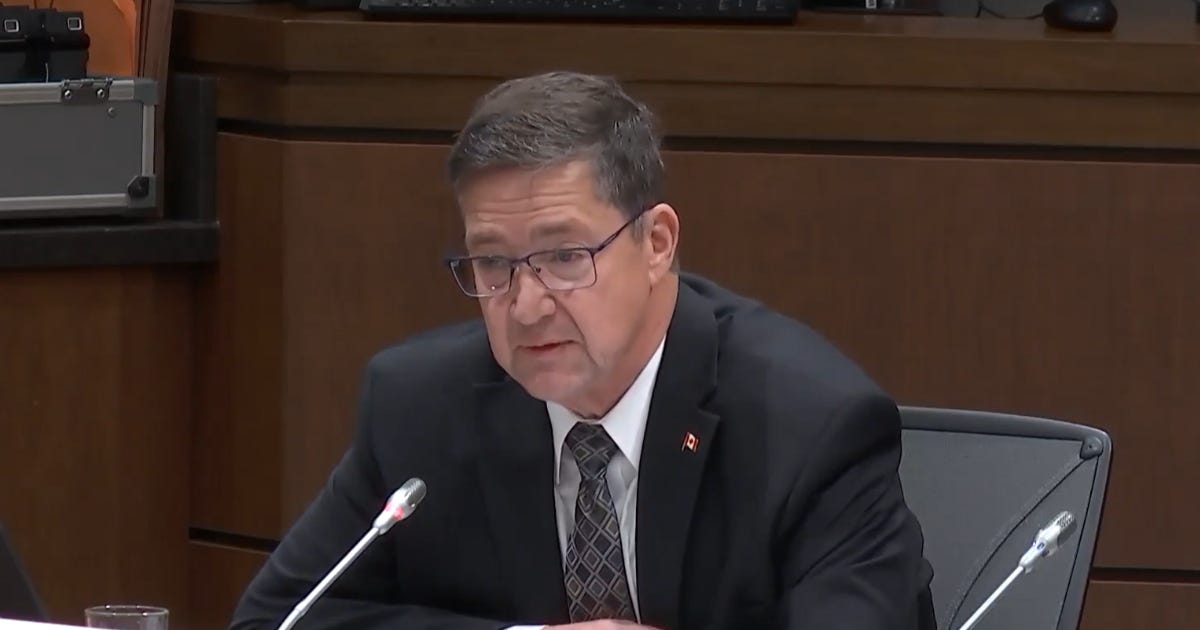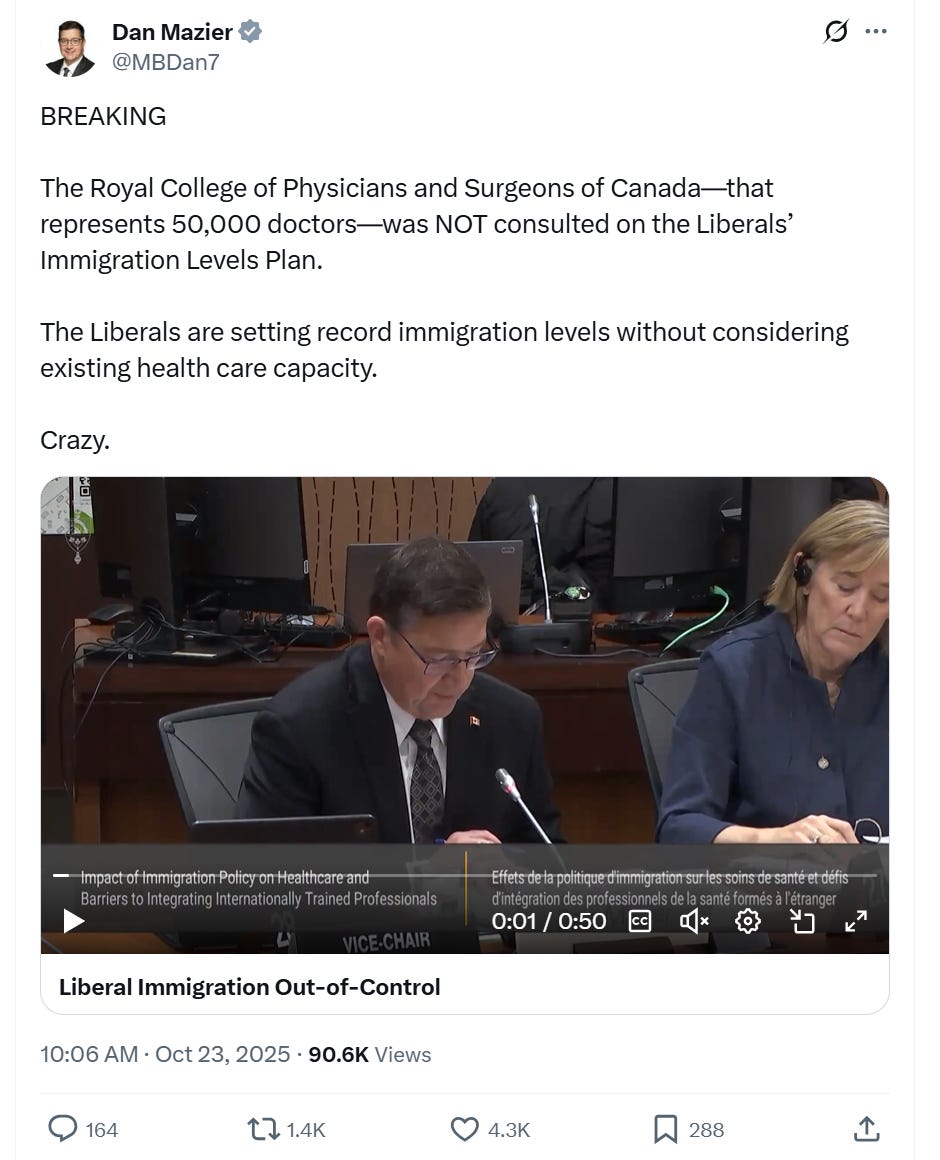Healthcare groups say feds failed to consult on immigration impact
Healthcare experts from Canada’s top medical colleges, regulatory bodies, and health associations say Liberal policymakers never consulted them on the impacts of immigration on the healthcare system.
Healthcare experts from Canada’s top medical colleges, regulatory bodies, and health associations say Liberal policymakers never consulted them on the impacts of immigration on the healthcare system.
Conservatives have been hammering officials and experts since Parliament resumed on whether the Liberal government has taken the healthcare system into account when deciding immigration numbers. So far, no one has confirmed that such consultations took place with experts. Some officials have deferred to provinces, saying it is up to them to provide that information.
Conservative health critic Dan Mazier asked Dr. Christopher Watling, the CEO of the Royal College of Physicians and Surgeons, an institution with around 50,000 healthcare professionals as members, whether the feds consulted the group. During a House of Commons’ health committee meeting on Thursday, Watling said they had not.
Watling told Mazier that he believes that population growth is a factor that impacts Canada’s healthcare system, and that immigration is a variable that impacts population growth.
“According to this year’s immigration levels plan, the federal government is planning to allow 395,000 permanent residents and 673,000 non-permanent residents into Canada this year,” Mazier said. “Will all these individuals be able to get a family doctor this year if they want one?”
Watling said that there was “a lot of evidence” to say that Canadians at large lack family doctors. He also noted that he would like to see a “stronger link” between Canada’s immigration and healthcare systems.
During the committee, the director of Internationally Trained Physicians of Canada, Dr. Therese Bichay, noted that 6.5 million Canadians are without family doctors and Canada has a shortage of 23,000 general practitioners. When asked, she similarly said that there is a disconnect between Canada’s immigration system and its healthcare system.
Bichay also said Canada should help license the medically trained immigrants in Canada before bringing in more foreign doctors, many of whom will face similar barriers to becoming licensed practitioners in Canada.
Mazier later asked Dr. Carrie Bernard, the president of the College of Family Physicians of Canada, whether her organization was consulted or if any data on the “current capacity of Canada’s healthcare system” was requested by immigration officials. Bernard also denied that such requests were made by federal officials.
Bernard noted that individuals without family doctors are not “receiving proper healthcare” and that having a family physician is a “super important part” of having access to the “excellent healthcare that Canadians expect and deserve.”
Conservative MP Matt Strauss said that means 15 per cent of Canadians are “definitely not receiving proper healthcare.”
When asked whether those over one million new immigrants would have to go to emergency rooms to see doctors without access to family doctors, Watling said efforts have been made in recent years to remedy the issue, and that there is “certainly hope” that the situation is improving.
Dr. Giuseppe Fuda, the president of the Canadian Anesthesiologists Society, couldn’t give a precise number of how many anesthesiologists Canada needs, but he said that after years of efforts to remedy the issue, he would estimate that Canada has a “moderate shortage” of anesthesiologists.
Fuda similarly was not consulted by Liberal immigration officials. Strauss said it was “another crying shame” that his association, which represents anesthesiologists across Canada, was not consulted.
After noting a Health Canada report from 2022 that stated there was a 60,000 registered nurse shortfall in Canada, Conservative MP Helena Konanz asked Dr. Rani Srivastava, the president-elect of the Canadian Association of Schools of Nursing, whether Liberal immigration officials had ever consulted her organization.
Srivastava similarly said she was not aware of any consultations but that she would “absolutely” like to be consulted in the future.
Stephanie Price, the executive director of the Federation of Medical Regulatory Authorities of Canada, also claimed she was never consulted, and no requests for data were ever made to her regulatory agency. Price also said she would like to be consulted in the future.
Liberal MP Doug Eyolfson disputed the Conservatives’ line of reasoning, saying most immigrants are young and, as such, are not being a burden on the medical system, but many nurses are overwhelmingly immigrants.





This is not surprising since I'm sure the Liberals didn't even research accommodations suitable for families, cost of housing (Canadians cannot access affordable housing and some are now on the streets) schools, and available jobs.
Sadly, this is part of strategy to create chaos and desperation for both citizens and immigrants alike. With a weakened, depressed and oppressed country, the new boss walks in unchallenged and even welcomed.
Mass immigration not only affected health care but also our education system, housing, and policing.